Searching for a missing father in the ravines and orange groves of Valencia
The children of José Carlos Macario, who disappeared in the flash floods, have spent days combing the ravaged area where they believe the car he was driving might have ended up. It’s a titanic task, but better than staying put
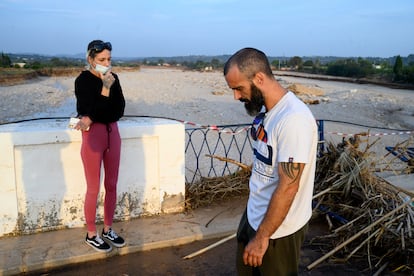

Cristian Macario began searching for people gone missing in Valencia’s flash floods before he even knew that his own father was one of them. Like many other residents of affected areas in this part of eastern Spain, he went out in search of survivors on Wednesday, October 30, just as everyone else was beginning to explore the extent of the destruction. Because he’d lost his cell phone reception, he did not find out until the next day that his father, José Carlos Macario Gil, had not given any signs of life since Tuesday afternoon, when he began to drive home from work with a colleague.
At that point Cristian was forced to prioritize. Starting from the last place where the GPS signal from his father’s colleague’s cell phone was detected, he has combed many miles of land together with his brother Paco and several friends. The task seems almost impossible. The search area is gigantic, and many vehicles are buried under the mud. But Cristian prefers this titanic task to just waiting for the phone to ring with fateful news: “I know we are groping in the dark, but if I stand still, I get nervous.”
The searches begin early in the morning and end when the sun sets. To coordinate their efforts, the two brothers and their friends have created a WhatsApp group called Siempre Fuertes (Always Strong), a name that is followed by three emoticons: a flexed arm, crossed fingers and a four-leaf clover. Cristian, who has some military training, has instructed everyone to fan out. They wear boots, gloves and masks. And they have seen all kinds of things. “Four or five corpses,” says Cristian, a 40-year-old bricklayer. “More than I would have liked to have seen in this lifetime.”
Cristian’s father is 63 years old and he was driving a black Nissan Almera minivan with license plate number 0023 CPC. Sitting in the passenger seat was Juan Vicente Madrid, 50. Both men left the town of Aldaia on Tuesday on their way to Cheste. The last thing the brothers know about José Carlos is that one of their stepbrothers, aged 11, phoned him and the father replied that he could not talk on the phone because he was driving and could barely see because of the rain.
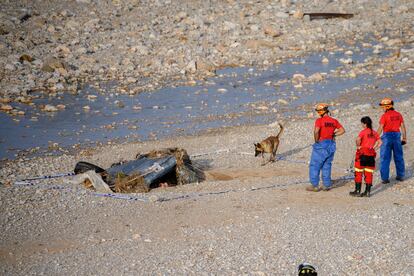
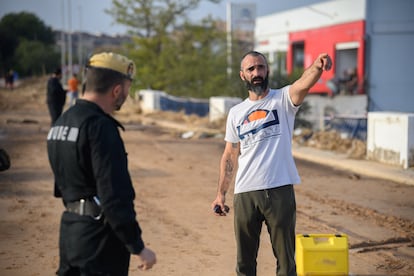
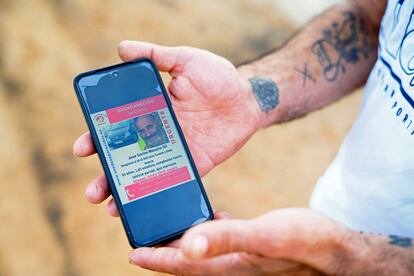
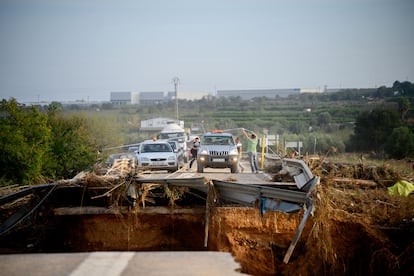
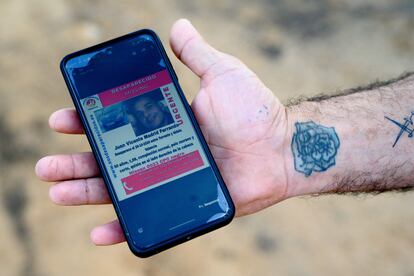
Cristian tells his story on his first day of rest, eight days after a catastrophe that has left a death toll of at least 218 and residents in shock as they struggle to resume their lives. He does so on a broken bridge outside the center of Cheste, just above the Poyo ravine, which has become ground zero of the destruction. He is accompanied by his brother-in-law Daniel and stepsister Charo.
From this vantage point, they can see a good part of the territory they have already searched. Below the bridge, about 50 meters away, they see a car buried in the ground and marked off with police tape as if it were the scene of a crime. Some members of the military unit UME approach with a search and rescue dog. At times there is silence. The dog sniffs around. More silence. “If the animal doesn’t bark, there is no body,” explains Brigadier Cañizares, who watches from the top of the bridge as his colleagues and the dog move away from the vehicle.
Cristian has seen this scene play out several times. On Monday, they found a “graveyard of cars,” all piled up. None of them was his father’s Nissan. When the two brothers and their friends find a body in a vehicle, they mark it with a stick and a rope, so that the authorities will know. They have hardly come across any uniformed officers. Many more would be needed for the job that is still left to do. Those they have seen have taken down information about their father and the car. The Civil Guard has taken DNA samples from Paco. The search could end at any time, with just one phone call. “What we want is for it to end. For better or for worse. But for it to end now,” says Cristian.
Tomorrow at 9 a.m. they will resume their searches. They hope to comb an industrial area where they have heard that drivers who wanted to enter Cheste were diverted to. They return on foot towards the center of Cheste, a town of around 9,000 residents. As they move away from the ravine area, they barely notice any damage. Cristian, who has been walking for days along paths that smell of corpses, is surprised by the contrast: “I don’t know if the reality is this over here or what there is back there.”
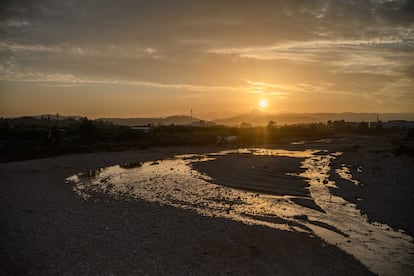
Sign up for our weekly newsletter to get more English-language news coverage from EL PAÍS USA Edition
Tu suscripción se está usando en otro dispositivo
¿Quieres añadir otro usuario a tu suscripción?
Si continúas leyendo en este dispositivo, no se podrá leer en el otro.
FlechaTu suscripción se está usando en otro dispositivo y solo puedes acceder a EL PAÍS desde un dispositivo a la vez.
Si quieres compartir tu cuenta, cambia tu suscripción a la modalidad Premium, así podrás añadir otro usuario. Cada uno accederá con su propia cuenta de email, lo que os permitirá personalizar vuestra experiencia en EL PAÍS.
¿Tienes una suscripción de empresa? Accede aquí para contratar más cuentas.
En el caso de no saber quién está usando tu cuenta, te recomendamos cambiar tu contraseña aquí.
Si decides continuar compartiendo tu cuenta, este mensaje se mostrará en tu dispositivo y en el de la otra persona que está usando tu cuenta de forma indefinida, afectando a tu experiencia de lectura. Puedes consultar aquí los términos y condiciones de la suscripción digital.








































